| (insert your NIE or newspaper logo here) |
Weekly Online LessonOnline Lesson ArchiveGrade Level: 3-6
|
The Pests of Summer
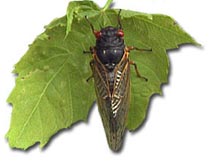 After living underground for nearly two decades, some noisy, uninvited guests may be crashing your next barbecue. In fact, millions of them have been swarming through parts of the East and Midwest since mid-May, 2004.
After living underground for nearly two decades, some noisy, uninvited guests may be crashing your next barbecue. In fact, millions of them have been swarming through parts of the East and Midwest since mid-May, 2004.
Looking for mates and places to lay eggs, these visitors are periodical cicadas -- insects that spend 13 or 17 years (depending on the species) underground in their early years, feeding on sap from tree roots. When the nymphs emerge in late spring, they transform into flying adults, then buzz off to complete their life cycle before they die in about a month.
Cicadas are really noisy bugs, so if you live where they do you may want to keep a pair of earplugs handy. Their songs are cricket-like, and they're loud because they travel in large groups.
Cicadas won't be the only insect to bother us this summer, though. Pests such as mosquitoes, ants, termites, ticks, spiders, and fleas, will also crawl, fly or eat their way into our homes. Some can harm our health, and others can damage property.
This week's lesson will help you defend yourself and your home against some of these pests. You'll find out what kinds there are, how they live, and what you can do to keep them away. You'll also uncover the cicada life cycle, and see how to collect their old skins!
Gimme Some Skin
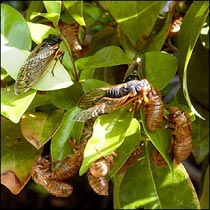 First, let's turn our attention to the season's most recent -- and loudest -- buzz: cicadas.
First, let's turn our attention to the season's most recent -- and loudest -- buzz: cicadas.
Begin with a stop at Cicada Watch 2004, hosted by the College of Mt. Joseph in Cincinnati, Ohio, and read the introduction on the home page.
Which states will see the most cicadas? What time of day do the nymphs crawl out of their shells? What are the three species taking flight this year?
Uncover a few more facts at the Cicadas FAQs page. For example, Do both male and female cicadas sing? When will the cicadas emerge? What is a brood? Which brood number is the one emerging this year?
Also, check out the Cicada Calendar to get an overview of their life cycle's timeline.
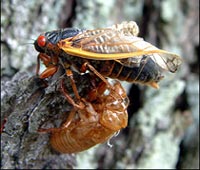 Now you get to join the Kids' Cicada Hunt! Here, you'll meet two brothers -- Ethan and Aaron -- and Eric, their Dad, who live in Chicago, Illinois.
Now you get to join the Kids' Cicada Hunt! Here, you'll meet two brothers -- Ethan and Aaron -- and Eric, their Dad, who live in Chicago, Illinois.
First read about their hunt for annual cicadas then about their hunt for periodical cicadas. What kinds of differences between the two types of cicadas did they discover? Were there any similarities?
If you have time, you can solve cicada mysteries with Ethan and Aaron, or see what else they found.
Have you ever found cicadas, wasps, beetles, or other insects, alive or dead? Did you ever find more than one species in the same area? If so, how do you think each species survived there? Identify each species and investigate their life cycles to solve the mystery!
Know Your Pests
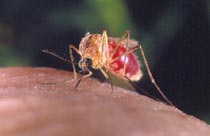 The noise cicadas emit sure can make them pests, but at least they're only around for about a month. Of course, there are plenty of other pests that will bother us humans the entire summer.
The noise cicadas emit sure can make them pests, but at least they're only around for about a month. Of course, there are plenty of other pests that will bother us humans the entire summer.
To find out more about these bugs and other pests, take a trip to PestWorld for Kids. After watching the Intro Movie, Continue to the contents page.
This site requires Flash Player, and you can browse the contents with or without audio speakers.
Shuffle over to the Learning Games section, where you can try your hand at being a Pest Detective. After the introduction, click Go On and choose to investigate either The Case of the Gruesome Bite or The Case of the Collapsing House. You will uncover the clues then round of the usual suspects to interrogate. After solving the first case, investigate the second case. How does the collection of clues lead you to one suspect in each case?
Next, test your skills as a Pest Ranger cadet. Listen to Pest Commander Pete, grab your Top Secret gizmo, and Start your training as your chosen avatar.
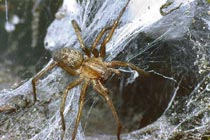 Walk around the Kitchen, Bedroom, and Outside with the gizmo to find a pest, click Show Pest on your gizmo's screen, then select a scanner mode. You will also pick up items in the rooms that will help you get rid of the different pests you find. The pests and the items you come across will show up on your Collected list on the right-hand side.
Walk around the Kitchen, Bedroom, and Outside with the gizmo to find a pest, click Show Pest on your gizmo's screen, then select a scanner mode. You will also pick up items in the rooms that will help you get rid of the different pests you find. The pests and the items you come across will show up on your Collected list on the right-hand side.
Find all of the pests inside and outside of the house and choose the best control method for each of them. Why did it take different methods to get rid of different pests? Which control methods limited food sources? What changes did you make so that pests would no longer find shelter in or around the house?
If you find a pest and you're not sure what it is, gather a few basic clues then try to Name That Pest. The game will ask you questions to narrow the field of suspects and try to pinpoint the culprit.
Back at the site's contents page, you can check out other Amazing Pests using the alphabetical list. So, while you're here, find out about some of the pests you haven't seen at the site yet, like Earwigs, Fleas, Gophers, Lice, Opossums, Pillbugs, and Ticks.
What is it about each pest's life cycle or survival habits that bothers people? Which ones carry disease? Which pests are easier to control than others, do you think, and why?
Which pests have you seen in or around your own house? Would you add any others to the list of Amazing Pests? If so, what kind of habitat does in live in? What are its food sources?
Newspaper Activities
Browse a current issue of Targetnewspaper to find articles about some type of pest. Does the news explain the life cycle of the pest, or what types of habitat it lives in? What does it eat? If people are concerned about the pest, what exactly bothers them about having the pest around? For example, are people getting sick or is property getting damaged? What are people doing to control the pest?
© Copyright 2004
Learners
Online,
Inc.
